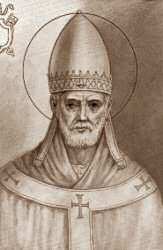.... then get on your knees and thank God for the Catholic Church and her Popes.
 |
| A thirteenth century "pocket" edition of the Latin Vulgate Bible. |
Prior to St. Damasus a great many Church Fathers proposed various canons of Scripture, but none until the late fourth century even had the same new testament that we have received today. Controversy usually centered around the Apocalypse of St. John the Divine, but also over some Catholic Epistles, some Greek books in the old testament, and a now-lost "Book of the Hebrews." No one of the Fathers had formally listed the current new testament canon until St. Athanasius did so in 367 A.D., much less make an attempt at enforcing a canon of the old testament, a bugaboo to most protestants.
But in 382 A.D., at a local synod in Rome, St. Damasus I issued the following decree (good part is at the bottom):
 |
| Pope St. Damasus |
It is likewise decreed: Now, indeed, we must treat of the divine Scriptures: what the universal Catholic Church accepts and what she must shun. The list of the Old Testament begins: Genesis, one book; Exodus, one book: Leviticus, one book; Numbers, one book; Deuteronomy, one book; Jesus Nave, one book; of Judges, one book; Ruth, one book; of Kings, four books [First and Second Books of Kings, Third and Fourth Books of Kings]; Paralipomenon, two books; One Hundred and Fifty Psalms, one book; of Solomon, three books: Proverbs, one book; Ecclesiastes, one book; Canticle of Canticles, one book; likewise, Wisdom, one book; Ecclesiasticus (Sirach), one book; Likewise, the list of the Prophets: Isaiah, one book; Jeremias, one book; along with Cinoth, that is, his Lamentations; Ezechiel, one book; Daniel, one book; Osee, one book; Amos, one book; Micheas, one book; Joel, one book; Abdias, one book; Jonas, one book; Nahum, one book; Habacuc, one book; Sophonias, one book; Aggeus, one book; Zacharias, one book; Malachias, one book. Likewise, the list of histories: Job, one book; Tobias, one book; Esdras, two books; Esther, one book; Judith, one book; of Maccabees, two books.
Likewise, the list of the Scriptures of the New and Eternal Testament, which the holy and Catholic Churchreceives: of the Gospels, one book according to Matthew, one book according to Mark, one book according to Luke, one book according to John. The Epistles of the Apostle Paul, fourteen in number: one to the Romans, two to the Corinthians [First Epistle to the Corinthians and Second Epistle to the Corinthians], one to the Ephesians, two to the Thessalonians [First Epistle to the Thessalonians and Second Epistle to the Thessalonians], one to the Galatians, one to the Philippians, one to the Colossians, two to Timothy [First Epistle to Timothy and Second Epistle to Timothy], one to Titus, one to Philemon, one to the Hebrews.
Likewise, one book of the Apocalypse of John. And the Acts of the Apostles, one book.Likewise, the canonical Epistles, seven in number: of the Apostle Peter, two Epistles [First Epistle of Peter and Second Epistle of Peter]; of the Apostle James, one Epistle; of the Apostle John, one Epistle; of the other John, a Presbyter, two Epistles [Second Epistle of John and Third Epistle of John]; of the Apostle Jude the Zealot, one Epistle.
Thus concludes the canon of the New Testament. Likewise it is decreed: After the announcement of all of these prophetic and evangelic or as well as apostolic writings which we have listed above as Scriptures, on which, by the grace of God, the Catholic Church is founded, we have considered that it ought to be announced that although all the Catholic Churches spread abroad through the world comprise but one bridal chamber of Christ, nevertheless, the holy Roman Church has been placed at the forefront not by the conciliar decisions of other Churches, but has received the primacy by the evangelic voice of our Lord and Savior, who says: "You are Peter, and upon this rock I will build My Church, and the gates of hell will not prevail against it; and I will give to you the keys of the kingdom of heaven, and whatever you shall have bound on earth will be bound in heaven, and whatever you shall have loosed on earth shall be loosed in heaven."The Pope later commissioned St. Jerome, a noted linguist, to do a fresh translation into common, vulgar Latin, setting in motion the creation of a text that would dramatically shape the spiritual, literary, liturgical, and academic direction of Western culture.
 |
| St. Jerome by Caravaggio |
No comments:
Post a Comment